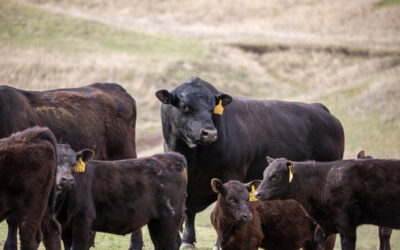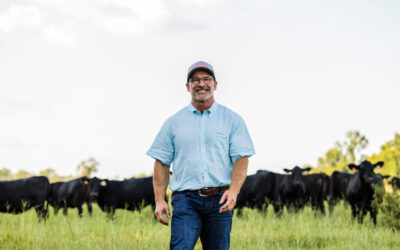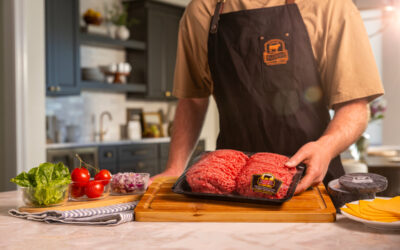
Nice to Meat Ya: David Livingston
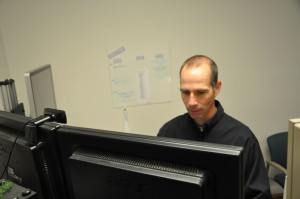
He grew up near Wooster, Ohio, but went to college in the 1980s in Ashland, Wis., to study biology and chemistry and keep playing soccer. Returning to the Buckeye State, he served as camp instructor for the National Wildlife Federation and another outdoor education center, then as an animal rehabilitation coordinator, nursing native wildlife back to health and a return to the wild. “We saw all kinds of baby rabbits and raccoons, as well as hawks, eagles and turkey buzzards…those kinds of things.”
OK, but how will this ever lead to CAB? When he got married, David and his wife decided to move closer to their families and start their own. SO, the job at CAB, right? Not yet. In fact, why would we ever expect to meet him at this stage?
For seven years, David put his biology degree to a new use doing toxicology studies at a research lab in Ashland, Ohio. By then, he was supervising seven other technicians and running to keep up with twin boys and their older brother.
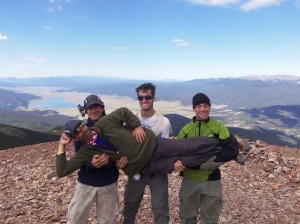
There was a “glass ceiling” at the lab for anyone trying to advance with no doctorate degree, and then he saw a want ad for a programmer at CAB….there was nothing in his resume that supported the notion, “but I knew I could do it.”
Perhaps it helped that the one-on-one with Eichar found the two are “wired the same way.” Brent had no computer training either, when he decided to create the relational database that became TIPS.
Both sides took a leap of faith that has proven a win-win. Lateral, logical thinking fits well with running the complex graphical user interface that is TIPS. When focus is required, David is a laser. But clearly his mind ranges far afield to consider what is coming down the pike and how to adjust.
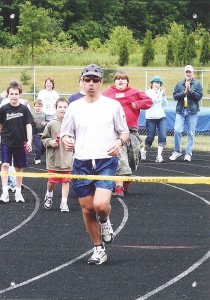
But at CAB his job is running TIPS, maintaining and improving it. The 17,000 partners around the world file regular reports, 97% electronically but some on paper (that was the other way around in 1999), and TIPS ensures it all adds up to “product ordered equals product sold.”
That’s how the world knows when they buy this brand at retail or in the restaurant, they can be sure it really is CAB and they can look forward to that dependable eating experience. But TIPS has grown to do much more as it gathers its billions of entries – no small feat in itself.
“You can have all the data in the world,” David notes, “but unless there’s some way to access it in a format that makes sense, it doesn’t do any good.”
David responds to scores of requests from “our creative staff” to further customize reports each year. There are at least 50 basic reports from feedlot data to beef cuts per carcass weight to seasonal patterns of sales movement, and each of those has dozens of options.
Account managers study numbers and ask what if. For example, they find price patterns for cuts their partner licensees want and help them buy when it costs less, thus adding more value to Angus cattle in contraseasonal ways.
Why? Knowledge is power. The kind of power that can eventually add to your bottom line.
~Steve
PS–Want to read this whole series? Here are the links:
- Introduction: Nice to Meat Ya
- Day 1: Ashley Pado
- Day 2: Scott Redden
- Day 3: Jesse Stucky
- Day 4: Bridget Wasser
- Day 5: Amanda Barstow
- Day 6: Josh Moore
- Day 7: Ruth Ammon
- Day 8: Bill Tackett
- Day 9: Dan Chase
- Day 10: Danielle Foster
- Day 11: Eric Mihaly
- Day 12: Jennifer Kiko
- Day 13: Mark Morgan
- Day 14: Meg and Matt Groves
- Day 15: Rod Kamph
- Day 16: Jonnie Schreffler
- Day 17: Brent Eichar
- Day 18: Alberto Diaz
- Day 19: Larry Kuehn
- Day 20: Bob Boliantz
You may also like
From Decline to Dominance
Initiated from a simple yet visionary idea, and pursued through the grit and tenacity of Angus breeders seeking a better future for the breed and Association members, it’s no accident that Certified Angus Beef is where it is today.
Smitty’s Service on CAB Board
Lamb continues to find himself struck by just how far-reaching the Angus breed has become. The brand’s growing demand and rising prime carcasses left a strong impression. He hopes everyone recognizes the vital connection built between consumers and Angus producers. Humbled by the opportunity to serve, Lamb reflects on his time as chairman with gratitude.
Success, Despite Challenges
Today’s market is complex and competitive. The collective effort of stakeholders across the supply chain positions Certified Angus Beef to meet the record demand for premium beef moving forward. Signals across the beef industry are clear and Angus farmers and ranchers seeking high-quality genetics that deliver premium beef are producing a product in high demand.

